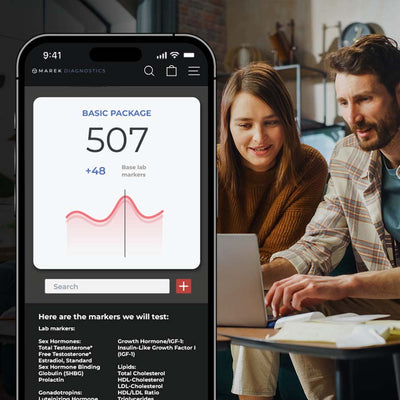Lipid Panel (Total Cholesterol, HDL, LDL, VLDL, Triglycerides, HDL/LDL Ratio)

Lipid Panel (Total Cholesterol, HDL, LDL, VLDL, Triglycerides, HDL/LDL Ratio)
Regular price$1000
$10.00
/
Diagnostic Blood Test:
- Total Cholesterol
- HDL Cholesterol
- LDL Cholesterol
- VLDL Cholesterol (calc)
- Triglycerides
- HDL/LDL Ratio
Total Cholesterol measures the levels of both high-density lipoprotein (HDL) and low-density lipoprotein (LDL) in the blood. Cholesterol is necessary for creating new cells, producing hormones, making vitamin D, and creating bile (a fluid that aids in digestion). However, too much cholesterol may raise the risk of heart attack and stroke.
High-density lipoprotein cholesterol (HDL-C) or “good” cholesterol is known to decrease the risk of heart attack and stroke by removing “bad” cholesterol from the blood vessels. HDL carries away other types of cholesterol to the liver in order to be flushed out of the body.
Low-density lipoprotein cholesterol (LDL-C) or “bad” cholesterol builds up within the blood vessels. LDL levels help predict risk of heart disease and stroke and provide information about whether lifestyle changes or medications may improve heart health and overall wellness.
Very low-density lipoprotein (VLDL) is similar to LDL however it mainly carries triglycerides. There is growing evidence that VLDL plays an important role in atherogenesis, in which plaques form on the interior walls of arteries, narrowing these passageways and restricting blood flow, which can lead to heart disease and increase the risk of stroke.
Triglycerides are a type of fat located in the blood. High triglyceride levels may be a result eating more calories than are burned. Triglycerides can harden and thicken the walls of the arteries, increasing the ability of “bad” cholesterol to form plaques and raising the risk of heart disease.
Note: Fasting is recommended for 12 hours prior to blood draw.
- Secure payments



